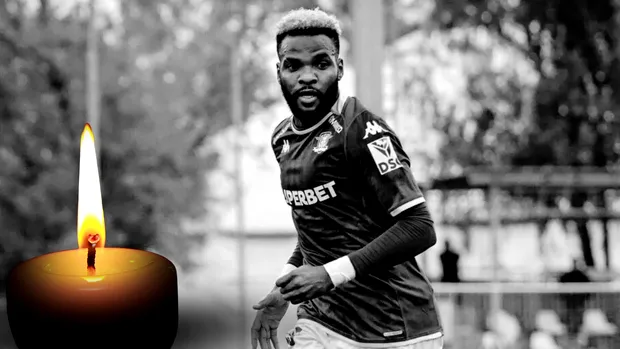Gabonese striker Aaron Boupendza dies suddenly as Zhejiang FC opts to play on

Zhejiang FC played their scheduled Chinese Super League fixture on Wednesday, just hours after the sudden death of their Gabonese forward Aaron Boupendza, triggering a wave of disbelief and sorrow across the footballing community in China.
Despite the heartbreaking news, the club, based in Hangzhou in southeastern China, made the controversial decision to proceed with the match.
The game, which ended in a 2-2 draw, was played under a heavy emotional cloud, with players and supporters visibly affected by the loss of the 28-year-old international.
Boupendza, a former youth product of Girondins de Bordeaux and widely respected for his professionalism and humility, was a key figure within the Zhejiang squad.
His sudden passing came as a profound shock, with the cause of death yet to be confirmed. Initial reports from local media described it as a “sudden death,” though official details remain unavailable.
The emotional weight of the occasion was evident throughout the match. Zhejiang FC’s foreign players were notably absent from the lineup, while those who did take to the pitch appeared subdued.
The atmosphere inside the stadium was both tense and surreal, with tributes pouring in from the stands. Boupendza’s name echoed repeatedly around the arena, fans held his jersey aloft in tribute, and thousands of phone flashlights lit up the terraces, casting a sea of white lights across the night sky in an overwhelming show of solidarity.
After the final whistle, players and staff gathered solemnly in front of the supporters. Team captain Cheng Jin, visibly shaken, offered a brief and emotional statement through tears.
“I’m sorry, it’s not a lack of respect for you. But I really have nothing to say,” he said, his voice breaking as he struggled to find words.
Head coach Raúl Caneda, equally affected, declined to comment on the team’s performance, instead acknowledging the emotional weight of the evening.
“Football has no place in such a context,” he said quietly, refusing to elaborate further.
The decision by the club to proceed with the match, rather than request a postponement, has sparked significant debate, both among fans and within football circles.
While some viewed the move as a way to honour Boupendza’s memory through the game he loved, others saw it as a misstep at a time when grief and reflection should have taken precedence.
Boupendza, who had also played for Hatayspor in Turkey and Al-Arabi in Qatar, had quickly become a fan favourite at Zhejiang, appreciated not just for his goal-scoring ability but also for his quiet, modest nature off the pitch. His unexpected death has left a void in the hearts of teammates, coaches, and supporters alike.
As tributes continue to pour in from around the globe, Zhejiang FC and the wider football community now begin to grapple with the emotional toll of losing a player in his prime—one who had so much more to give, both on and off the pitch.











